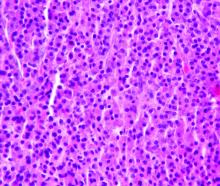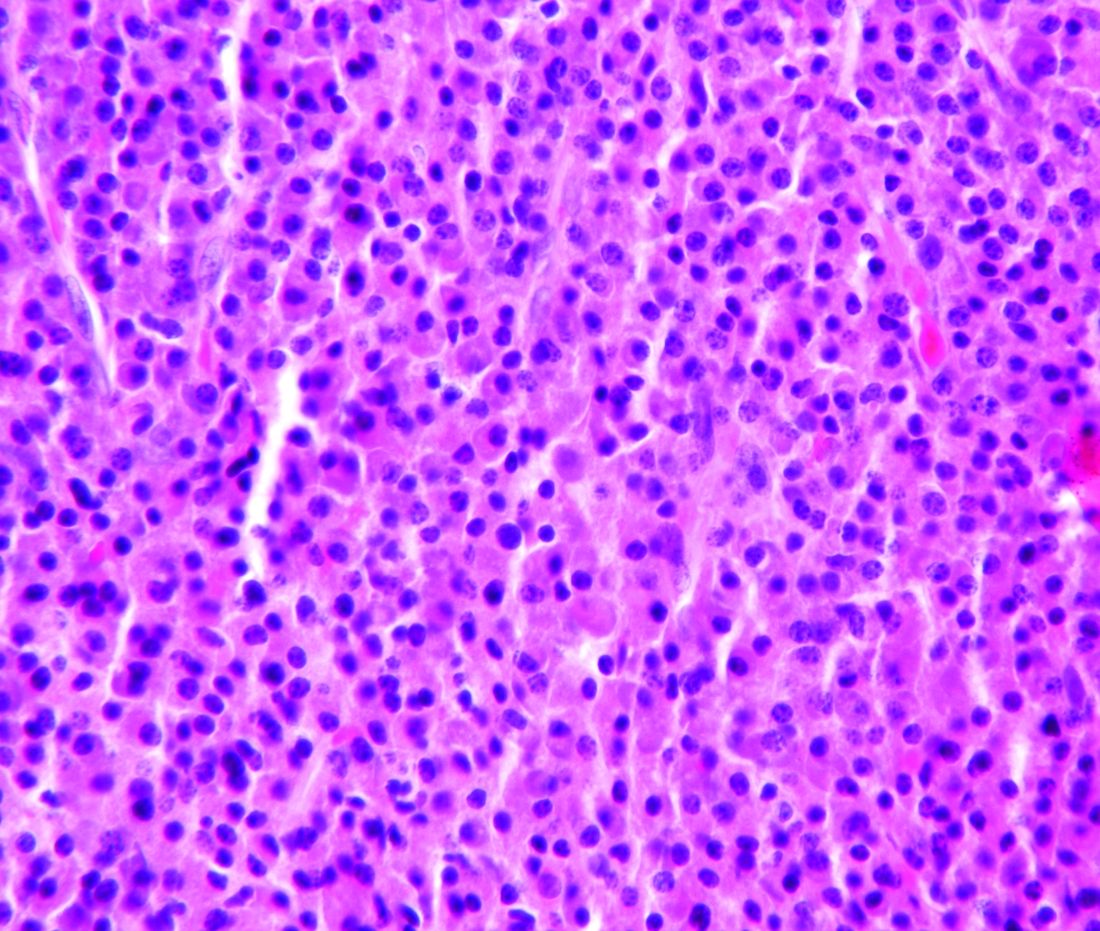User login
In patients with multiple myeloma who had already undergone multiple lines of therapy, the combination of ibrutinib and carfilzomib with or without dexamethasone produced a favorable rate of response and progression-free survival.
Ibrutinib and carfilzomib combination therapy was also associated with manageable safety in the phase 1 results of the ongoing study, investigators wrote in the journal Leukemia & Lymphoma.
The reported overall response rate in the study was 67%. Median progression-free survival was 7.2 months, which was “encouraging considering the poor outcomes often observed in this group,” Dr. Chari and colleagues wrote.
Carfilzomib, a selective and irreversible proteasome inhibitor, is indicated for patients with previously treated multiple myeloma. Ibrutinib, an orally administered covalent inhibitor of Bruton tyrosine kinase, already has Food and Drug Administration approval for treatment of several B-cell malignancies. Bruton tyrosine kinase is expressed in more than 85% of myeloma tumor cells, according to the researchers, and its signaling may contribute to development of drug resistance.
In an earlier phase 2 study, ibrutinib plus dexamethasone produced a 28% clinical benefit rate and median progression-free survival of 4.6 months. Preclinical data suggest combining ibrutinib and carfilzomib may have a synergistic effect, according to researchers.
To test that hypothesis, Dr. Chari and colleagues conducted a phase 1 dose-finding study including 43 myeloma patients who had previously received at least two lines of therapy, including bortezomib and an immunomodulatory agent. Among those patients, about three-quarters were refractory to bortezomib and one-quarter had high-risk cytogenetics.
A total of 35 patients in the study received ibrutinib and carfilzomib plus dexamethasone; 8 patients received only ibrutinib and carfilzomib.
Key phase 1 results included the 67% response rate, of which 21% had very good partial response and 2% had stringent complete response. No dose-limiting toxicities were observed.
Both carfilzomib and ibrutinib have known cardiac toxicities, but cardiac adverse events in this study did not reach dose-limiting toxicity criteria and were effectively managed by dose reductions or rechallenge, researchers reported.
Hypertension, anemia, pneumonia, fatigue, diarrhea, and thrombocytopenia were the most common grade 3 events observed. “Ultimately, toxicities and/or treatment discontinuations could be attributed to comorbidities, underlying disease factors, or toxicities due to prior therapies,” the researchers wrote.
Enrollment in phase 2b of the study is ongoing.
Dr. Chari received research funding from Pharmacyclics during the study and grants from other companies outside of the study work.
SOURCE: Chari A et al. Leuk Lymphoma. 2018 Apr 4. doi: 10.1080/10428194.2018.1443337.
In patients with multiple myeloma who had already undergone multiple lines of therapy, the combination of ibrutinib and carfilzomib with or without dexamethasone produced a favorable rate of response and progression-free survival.
Ibrutinib and carfilzomib combination therapy was also associated with manageable safety in the phase 1 results of the ongoing study, investigators wrote in the journal Leukemia & Lymphoma.
The reported overall response rate in the study was 67%. Median progression-free survival was 7.2 months, which was “encouraging considering the poor outcomes often observed in this group,” Dr. Chari and colleagues wrote.
Carfilzomib, a selective and irreversible proteasome inhibitor, is indicated for patients with previously treated multiple myeloma. Ibrutinib, an orally administered covalent inhibitor of Bruton tyrosine kinase, already has Food and Drug Administration approval for treatment of several B-cell malignancies. Bruton tyrosine kinase is expressed in more than 85% of myeloma tumor cells, according to the researchers, and its signaling may contribute to development of drug resistance.
In an earlier phase 2 study, ibrutinib plus dexamethasone produced a 28% clinical benefit rate and median progression-free survival of 4.6 months. Preclinical data suggest combining ibrutinib and carfilzomib may have a synergistic effect, according to researchers.
To test that hypothesis, Dr. Chari and colleagues conducted a phase 1 dose-finding study including 43 myeloma patients who had previously received at least two lines of therapy, including bortezomib and an immunomodulatory agent. Among those patients, about three-quarters were refractory to bortezomib and one-quarter had high-risk cytogenetics.
A total of 35 patients in the study received ibrutinib and carfilzomib plus dexamethasone; 8 patients received only ibrutinib and carfilzomib.
Key phase 1 results included the 67% response rate, of which 21% had very good partial response and 2% had stringent complete response. No dose-limiting toxicities were observed.
Both carfilzomib and ibrutinib have known cardiac toxicities, but cardiac adverse events in this study did not reach dose-limiting toxicity criteria and were effectively managed by dose reductions or rechallenge, researchers reported.
Hypertension, anemia, pneumonia, fatigue, diarrhea, and thrombocytopenia were the most common grade 3 events observed. “Ultimately, toxicities and/or treatment discontinuations could be attributed to comorbidities, underlying disease factors, or toxicities due to prior therapies,” the researchers wrote.
Enrollment in phase 2b of the study is ongoing.
Dr. Chari received research funding from Pharmacyclics during the study and grants from other companies outside of the study work.
SOURCE: Chari A et al. Leuk Lymphoma. 2018 Apr 4. doi: 10.1080/10428194.2018.1443337.
In patients with multiple myeloma who had already undergone multiple lines of therapy, the combination of ibrutinib and carfilzomib with or without dexamethasone produced a favorable rate of response and progression-free survival.
Ibrutinib and carfilzomib combination therapy was also associated with manageable safety in the phase 1 results of the ongoing study, investigators wrote in the journal Leukemia & Lymphoma.
The reported overall response rate in the study was 67%. Median progression-free survival was 7.2 months, which was “encouraging considering the poor outcomes often observed in this group,” Dr. Chari and colleagues wrote.
Carfilzomib, a selective and irreversible proteasome inhibitor, is indicated for patients with previously treated multiple myeloma. Ibrutinib, an orally administered covalent inhibitor of Bruton tyrosine kinase, already has Food and Drug Administration approval for treatment of several B-cell malignancies. Bruton tyrosine kinase is expressed in more than 85% of myeloma tumor cells, according to the researchers, and its signaling may contribute to development of drug resistance.
In an earlier phase 2 study, ibrutinib plus dexamethasone produced a 28% clinical benefit rate and median progression-free survival of 4.6 months. Preclinical data suggest combining ibrutinib and carfilzomib may have a synergistic effect, according to researchers.
To test that hypothesis, Dr. Chari and colleagues conducted a phase 1 dose-finding study including 43 myeloma patients who had previously received at least two lines of therapy, including bortezomib and an immunomodulatory agent. Among those patients, about three-quarters were refractory to bortezomib and one-quarter had high-risk cytogenetics.
A total of 35 patients in the study received ibrutinib and carfilzomib plus dexamethasone; 8 patients received only ibrutinib and carfilzomib.
Key phase 1 results included the 67% response rate, of which 21% had very good partial response and 2% had stringent complete response. No dose-limiting toxicities were observed.
Both carfilzomib and ibrutinib have known cardiac toxicities, but cardiac adverse events in this study did not reach dose-limiting toxicity criteria and were effectively managed by dose reductions or rechallenge, researchers reported.
Hypertension, anemia, pneumonia, fatigue, diarrhea, and thrombocytopenia were the most common grade 3 events observed. “Ultimately, toxicities and/or treatment discontinuations could be attributed to comorbidities, underlying disease factors, or toxicities due to prior therapies,” the researchers wrote.
Enrollment in phase 2b of the study is ongoing.
Dr. Chari received research funding from Pharmacyclics during the study and grants from other companies outside of the study work.
SOURCE: Chari A et al. Leuk Lymphoma. 2018 Apr 4. doi: 10.1080/10428194.2018.1443337.
FROM LEUKEMIA & LYMPHOMA
Key clinical point:
Major finding: The overall response rate was 67%, including a 21% very good partial response and 2% stringent complete response.
Study details: A phase 1 dose-finding study including 43 myeloma patients who had previously received at least two lines of therapy.
Disclosures: Dr. Chari received research funding from Pharmacyclics during the study and grants from other companies outside of the study work.
Source: Chari A et al. Leuk Lymphoma. 2018 Apr 4. doi: 10.1080/10428194.2018.1443337.

